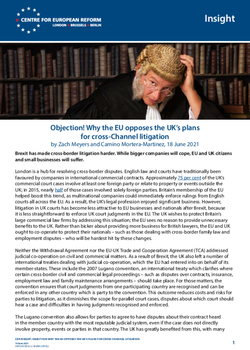
Objection! Why the EU opposes the UK's plans for cross-Channel litigation
Brexit has made cross-border litigation harder. While bigger companies will cope, EU and UK citizens and small businesses will suffer.
London is a hub for resolving cross-border disputes. English law and courts have traditionally been favoured by companies in international commercial contracts. Approximately 75 per cent of the UK’s commercial court cases involve at least one foreign party or relate to property or events outside the UK; in 2015, nearly half of those cases involved solely foreign parties. Britain’s membership of the EU helped boost this trend, as multinational companies could immediately enforce rulings from English courts all across the EU. As a result, the UK’s legal profession enjoyed significant business. However, litigation in UK courts has become less attractive to EU businesses and nationals after Brexit, because it is less straightforward to enforce UK court judgments in the EU. The UK wishes to protect Britain’s large commercial law firms by addressing this situation; the EU sees no reason to provide unnecessary benefits to the UK. Rather than bicker about providing more business for British lawyers, the EU and UK ought to co-operate to protect their nationals – such as those dealing with cross-border family law and employment disputes – who will be hardest hit by these changes.
Litigation in UK courts has become less attractive to EU businesses and nationals after Brexit, because it is less straightforward to enforce UK court judgments in the EU.
Neither the Withdrawal Agreement nor the EU-UK Trade and Cooperation Agreement (TCA) addressed judicial co-operation on civil and commercial matters. As a result of Brexit, the UK also left a number of international treaties dealing with judicial co-operation, which the EU had entered into on behalf of its member-states. These include the 2007 Lugano convention, an international treaty which clarifies where certain cross-border civil and commercial legal proceedings – such as disputes over contracts, insurance, employment law and family maintenance arrangements – should take place. For those matters, the convention ensures that court judgments from one participating country are recognised and can be enforced in any other country which is party to the convention. This outcome reduces costs and risks for parties to litigation, as it diminishes the scope for parallel court cases, disputes about which court should hear a case and difficulties in having judgments recognised and enforced.
The Lugano convention also allows for parties to agree to have disputes about their contract heard in the member country with the most reputable judicial system, even if the case does not directly involve property, events or parties in that country. The UK has greatly benefited from this, with many foreign parties agreeing to have cases heard in UK courts. If the UK is not a member of the convention, the recognition and enforceability of UK court judgments will be less certain, which reduces the attractiveness of the UK as a forum for foreign litigation.
The UK applied to accede to the Lugano convention on April 8th 2020. Accession would allow the UK to preserve most of the litigation-related benefits that it enjoyed as an EU member-state. UK judgments would still be enforceable throughout the EU and most European Free Trade Association (EFTA) countries without additional hurdles. (Iceland, Norway and Switzerland are parties, while Liechtenstein is not). In commercial contracts, the parties often agree which country’s courts should hear any disputes: if the UK joined the Lugano convention, the parties’ agreement would also largely continue to be respected.
However, the EU needs to agree to the UK’s accession. The convention is open to EU and EFTA members and to certain external territories associated with EU members. Other states, such as the UK, may only accede with the unanimous agreement of the existing parties to the convention. Iceland, Norway and Switzerland have already supported the UK’s accession. However, on May 4th 2021, the European Commission said that the UK’s application should be refused.
According to the Commission, the Lugano convention is a “flanking measure for the EU’s economic relations with the EFTA/EEA countries”, which, in turn, necessitates a high level of trust between the parties to the convention. This makes sense: before automatically accepting and agreeing to enforce judgments from a third country, the EU must trust the integrity and independence of that third country’s judicial system, and ensure it has mechanisms to correct the situation if that judicial system is compromised. But, in this case, the Commission’s argument is not convincing.
The UK’s judicial system is world-renowned, and often relied upon in cross-border disputes; there is no evidence that the standing or integrity of its judicial system has been undermined by Brexit. And the Commission cannot credibly argue that closer relations with the EU are contingent on the integrity of the UK’s judicial system while judicial independence within the EU’s territory is under threat in Poland, Hungary and elsewhere. The TCA also includes provisions to facilitate smooth judicial collaboration on criminal matters – which, in principle, rely on the assumption that Britain’s legal system protects the fundamental rights of EU nationals who are defendants in criminal proceedings or convicted of criminal offences. It is hardly plausible to impose a higher threshold for co-operation in civil litigation.
A more likely explanation for the Commission’s reticence to allow the UK to re-join the convention is that Britain remains a difficult partner for the EU on a range of issues, not least in honouring its own word. EU officials remain understandably wary of the UK government’s perceived willingness to pick fights with the EU to boost its domestic popularity. The continuing row over the Northern Ireland protocol, which the UK government signed at the beginning of last year, has dampened relations with both EU governments and the EU institutions. The mood has also been soured by spats over fishing, vaccines and the UK government’s general predilection to talk the EU down, so as to demonstrate that Brexit was a great idea. Patience is wearing thin and there is little appetite to do the UK and its legal sector any favours.
The Commission’s opinion is only advisory. The final decision rests with the Council of Ministers – a qualified majority of its members needs to agree to Britain’s application, after hearing the European Parliament’s opinion. The convention requires the EU to try to take a decision within 12 months of the UK’s application, by April 8th 2021. But that timeframe is not legally binding, and it appears that the EU is prepared to sit on the UK’s request for now. That is sensible and less inflammatory than an express rejection. In the meantime, the EU ought to signal to the UK that accession may be possible if UK-EU relations improve and the UK becomes a more constructive partner. For the UK, that might require a less confrontational approach: for example, the UK has refused to countenance the EU’s proposals which would address much of the current tension over the Northern Ireland protocol, over claims that Brussels’ plans would be contrary to the people’s wish to “take back control”.
The EU ought to signal to the UK that accession may be possible if UK-EU relations improve and the UK becomes a more constructive partner.
Until relations improve, companies and citizens involved in cross-Channel litigation will largely have to rely on domestic law provisions and the 2005 Hague Convention on Choice of Court Agreements. The UK acceded to that convention on September 28th 2020. However, the Hague convention primarily covers commercial disputes (it excludes employment contract and consumer disputes, and family law matters, among others), and only applies when parties in a commercial contract have agreed on a single country which courts may adjudicate a dispute – and even then there is some uncertainty. While the Hague convention is therefore limited, many larger businesses will probably be able to rely on it for big commercial disputes, to mitigate the impact of the UK’s exclusion from the Lugano convention. Even if they cannot rely on the Hague convention, big companies are more likely than individuals to have the resources to cope with delays and uncertainty to litigation and judgments being enforced. EU and UK citizens and small businesses with cross-border interests – such as in family law and employment disputes – will not. They are more likely to feel the impact of litigation becoming more costly, risky and uncertain.
Brexit has already hit small businesses and citizens hard. The EU is right to say that judicial co-operation requires a high degree of trust between the parties. But the Union has co-operation agreements with countries outside the bloc, like the US, in various areas, like mutual legal assistance. And the TCA provisions on criminal matters assume that the EU already trusts that the UK legal system protects EU nationals’ fundamental rights. But the UK government will not see much goodwill from the other side of the Channel unless it changes its collision course with Brussels. After years of tough and, at times, exasperating negotiations, the UK should concentrate its efforts on winning friends and building back trust. The Lugano convention is another stumbling block on the road to a more constructive relationship between the UK and the EU. It will surely not be the last.
Zach Meyers is a research fellow and Camino Mortera-Martinez is a senior research fellow at the Centre for European Reform.


Add new comment